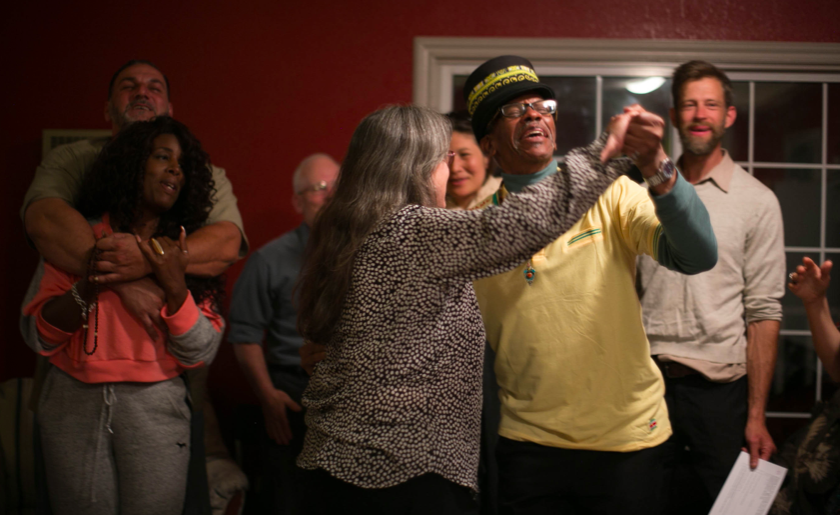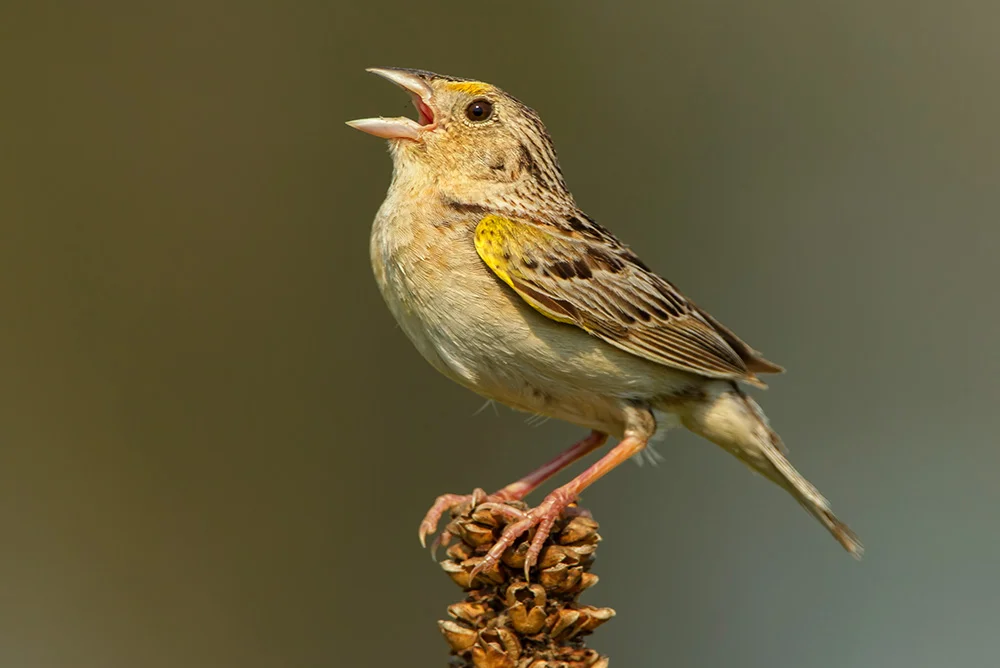Canticle Farm: One Heart, One Home, One Block at a Time (Anne Symens-Bucher)
Anne Symens-Bucher is one of the founders of Canticle Farm, an intentional community “doing the work that reconnects” in Oakland, CA.
Canticle Farm: One Heart, One Home, One Block at a Time
by Anne Symens-Bucher
Canticle Farm is an intentional community experimenting at the intersection of faith-based, social justice-based, and Earth-based nonviolent activism. Inspired by Franciscan spirituality and Joanna Macy’s body of teachings known as the Work That Reconnects, we are forty people living in eight houses around a large garden in East Oakland, California, and on one hundred acres in the Sierra Foothills. In Oakland, we have removed the fences between the houses, creating an urban oasis, and reminding ourselves that we are here to remove both physical fences as well as the ones we have constructed in our hearts and minds. Our community is very diverse, and we are working to heal across the differences of race, gender, class, sexual orientation, age, and religion.
In Lisjan Ohlone territory in Oakland, each house is home to members of the community and manifests Canticle Farm’s mission in a particular way. One of the eight houses’ partners with Sogorea Te’, an indigenous women-led land trust that facilitates the return of indigenous land to indigenous people. Another is home for men paroled from life sentences who are working with incarcerated and formerly incarcerated populations to transform the prison system. One hosts a sanctuary program for people seeking asylum in the US, and another is home to youth climate activists. Lastly, one engages with the surrounding neighborhood building relationships and partnering to host a weekly distribution of food and herbal medicines.
In the Sierra Foothills, on one hundred acres of ancestral Sierra Miwok territory, Canticle Farm tends land that was for over forty years a Catholic Worker Farm. We are both expanding and continuing the Catholic Worker legacy of hospitality, regenerative farming and service. Through previous decades of extractive practices and climate change, the land has become very prone to the devastation of wildfires. Canticle Farm is developing relationships with indigenous tribes and protocols to restore the health of the forest ecology.
One of the ways to understand Canticle Farm is through our practices. I would like to highlight four: our weekly Sunday liturgy, our commitment to nonviolence, our restorative system, and our engagement with the Work That Reconnects. The word liturgy means the “work of the people.” The work we do as people together is opening our hearts as much as we can to embrace everyone and everything. We understand that there are two eucharistic traditions in the Christian tradition, the best-known evolving from the Last Supper. Our liturgy is based on the lesser-known lineage of the loaves and fishes. It is a tradition where everyone is invited to share and there is more than enough for everyone to eat.
We begin our liturgy with our Canticle Farm Welcome (inspired by the work of Training for Change). After each stanza we sing, “we are welcome here,” reminding each other that we too, belong in the circle:
“We would like to welcome…
All beings that inhabit Earth, human or otherwise: the two-legged, the four-legged, winged and finned, those that walk, fly, and crawl above the ground and below, in air and water.
People on all parts of the continuum of gender identity and sexual expression. Lesbian, gay, bisexual, heterosexual, transgender, gender fluid and non-binary, gender queer and two spirit people, all other queer folks; the sexually active and the celibate, and everyone for whom these labels don’t apply.
People of African descent, of Asian descent, of European descent, of First Nations descent in this land and abroad; people of mixed and multiple descents, and all of the languages spoken here.
Your bodies and bodies of all shapes and sizes, of all abilities and challenges. Those living with a chronic medical condition, visible or invisible.
People of all ages, those about to be born, the voices of children. All elder bodies, all pregnant bodies, all menstruating bodies and those who are currently bleeding; your ceremony is honored here.
People who identify as activists and those who don’t. Mystics, believers, non-believers, seekers of all kinds. Those who practice the Old Ways, all ancient and enduring Earth-honoring traditions, witches, pagans, pantheists, and wild creatures. Those who support us to be here.
Your emotions: joy, fear, grief, contentment, disappointment, surprise, outrage, anger and all else that flows through you.
Your families, genetic and otherwise. Those dear to us who have died. Please say their names (pause for a moment and allow a few names to be said aloud before continuing). Our ancestors and the future ones. The ancestors who lived in this land in this place where these buildings are now, and their descendants who still do: the Huchuin village of the Lisjan Ohlone people … We honor you through this work that we are undertaking.
We welcome all the plants, the green beings, the grasses and herbs, the flowers, cacti, shrubs and the tall trees from all places: redwood, oak, pine, cedar, willow, cypress and yew; the trees from the rainforests and swamps, the river bottoms and deserts; and also your wonderful companions, the mushrooms, the fungi that enrich and hold your soil and decompose your bodies to enhance Earth.
All non-material beings of this place and all places: beings of the wind, the forest, the desert, the ocean, as well as of this particular place, whether it is still intact and wild, or domesticated and paved over. We welcome you with the names the people native to this place gave you, and with the names by which you know yourselves.”
##
Another feature of our liturgy is what we have named as an “Acknowledgment and Commitment.” This prayer, inspired by the Penitential Rite from the Roman Catholic Mass, is one way that we practice our commitment to nonviolence. For us nonviolence means we are engaging in an indefinite expansion of our circle of care, having no ultimate enemies as we lean on the courage to speak truth with love and reach for solutions that work for all beings. We include our ancestors and future generations, as we believe they are always present with us. We speak these words as a prayer, acknowledging we will be engaged in this work of naming and healing for the rest of our lives:
We name that we live in a nation
created by enslavement and genocide of peoples,
the taking and destruction of their lands,
and the justification of these acts
by the Christian Doctrine of Discovery, white supremacy,
the Divine Right of Kings, and Manifest Destiny.
We acknowledge that some of us
continue to benefit from this history,
others of us continue to suffer from its injustices,
and some of us experience both.
Through grace and humility, we invite healing
as we ask forgiveness for what we and our ancestors have done
and failed to do.
With their help, we commit ourselves
to transform rather than transmit the trauma.
We believe conflict arises out of trauma. At Canticle Farm, we have a restorative system for the times we get disconnected from ourselves and each other because of trauma that has been transmitted, rather than transformed. We have a dedicated physical space and practices that can help us to heal. Our restorative circles’ room is intentionally designed with a glass door and a large window so that when people are inside the room, they can remember they are not separate from all the life in the abundant garden just outside. Just as important, when others walk by, they can see through the window their community mates engaged in a restorative process. In this way, we normalize the inevitable conflicts that arise in human community. We shift from experiencing conflict from something to be avoided to an opportunity for deeper connection, understanding and healing. When people join the community, we ask them to commit to our restorative system. And within the system, showing up to a particular restorative circle is a voluntary process. If someone is not able to do so in any given moment, we understand it as a lack of capacity, rather than a lack of willingness. Our capacity is impacted by our trauma. This is hard work as we struggle and stretch to keep coming back to opening our hearts to everyone and everything.
A key awareness to assist us in this trauma work is the spiritual and ecological awareness of the interconnected and interdependent nature of all life. Here we draw on the teachings of Joanna Macy and the frameworks of the “Great Turning” and the Work That Reconnects. The Great Turning is the shift that is happening right now in our world from attitudes and practices that are destroying our planet to those that are life-sustaining. The Great Turning offers us tools to face what David Korten calls the “Great Unraveling.”
Grounded in living systems theory and Buddhist teachings, the Work That Reconnects offers us experiential practices and theoretical understandings which move around a “spiral.” The spiral begins with gratitude, invites us to honor the pain we feel as we suffer with a suffering world, helps us shift to seeing a larger context for our existence than our own separate individual lives, and finally engages us to act on behalf of life, each in our own particular way.
We weave the four stages of the Spiral of the Work that Reconnects: Coming from gratitude, Honoring our pain for the world, Seeing with new eyes, and Going forth into our community rituals and practices. We have created a spiral walk in our garden, with particular landscaping for each of the four stages of the spiral journey. Whether it is our liturgy, a restorative circle, or a community ritual, we first ground in gratitude which helps us to be with the pain of whatever we are facing, shift our perception, and act on behalf of life.
Joanna Macy reminds us that gratitude does not depend on external circumstances and Francis of Assisi demonstrated this principle in his own life. When he was losing his eyesight, experiencing the painful and bleeding wounds of the stigmata, and on the margins of the community which had once embraced his leadership, he wrote the Canticle of Creation. As he faced his own personal great unraveling, he chose gratitude. Singing a song of interdependence and praise, he called the sun and moon and all of creation sister, brother, mother. And in the final hours of his life, he exhorted his followers: “I have done that which was mine to do, may Christ teach you yours.” In our time, as so many of our systems are unraveling, we at Canticle Farm are choosing to sing a song of gratitude and praise. We are a platform for the Great Turning, one heart, one home, one block at a time.
##
Select photos from Canticle’s Facebook page:
###
“We are taking down fences because we believe that true security lies in our relationships.” (Anne, 2015) Read more about the amazing Canticle Farms here or visit their website: CanticleFarmsOakland.org. Anne’s article is one of the keynote features from our Summer 2022 collection, Restoring Connective Tissue.
















